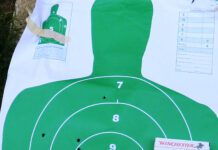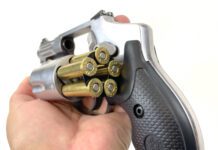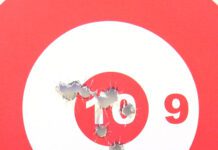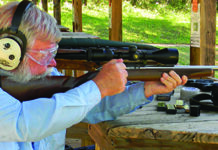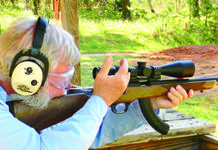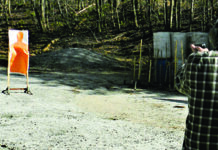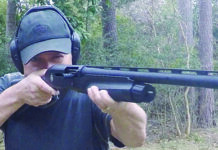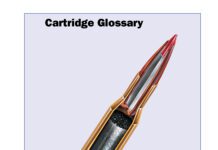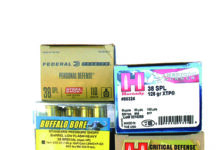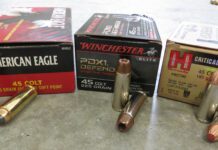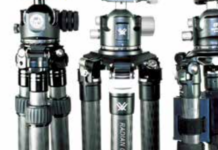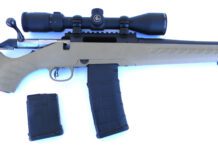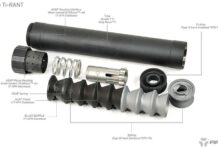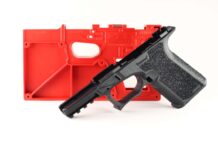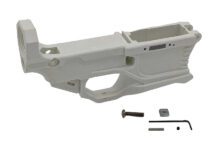We recently compared three single-action revolvers from Colt and Traditions chambered in 45 ACP or 45 Colt, also called 45 Long Colt. The two Colts are genuine factory-branded wheelguns, and the third is a modern Italian-made clone from Pietta, branded by Traditions Firearms. The Colts are not exactly the guns that won the West, and we are glad they are not. Well made of modern steel, they are good performers, but so is the Traditions revolver for a lot less money. The Traditions 1873 Frontier is a credible clone of the Colt 1873, with an improved action that allows carrying the handgun fully loaded with six cartridges.
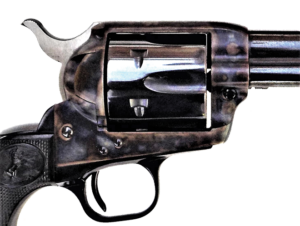
We based the test on the suitability of the revolvers for all-round use. This might mean Cowboy Action shooting, as a hunter’s backup handgun, for protection against wild beasts, and even home defense. We believe that most of these revolvers are used for recreation because they are fun shooters. But even a fun gun with no serious niche in the scheme of things should not be aggravating to use and fire and should fire to the point of aim, be smooth in operation, and provide the user their money’s worth. In this case, we found two handguns that met those criteria, and one that did not, in our estimation.
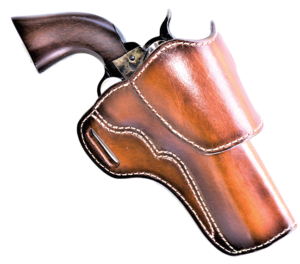
We wanted to learn what type of accuracy and performance you could expect from these revolvers. Protection against wild beasts, including feral dogs and the big cats, was part of the assessment. Would you be helpless with a modern single-action revolver in such a situation? Far from it. We also wanted to determine just how wide a spread there is in performance between low-cost and high-cost versions. As it turned out, there’s very little separation, and the difference may not be discernible except by the most experienced shooters. Here’s how they shook out:
Gun Tests Grade: B-
$2400
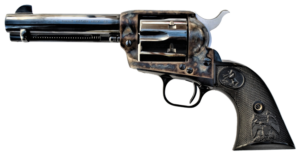
This is a classic 4.75-inch-barrel revolver in 45 Colt. The cylinder, frame, and barrel are nicely finished in blue, and the receiver is casehardened in appearance. The grips are hard rubber with the original Colt logo at the top. The grips were well fitted to the grip frame. The revolver is smooth enough, but not nearly as smooth as the Wiley Clapp model. These revolvers feature hammer-mounted firing pins and cannot be safely carried with a cartridge under the hammer. There is a small indent that clicks when the hammer is pulled to the rear, which purportedly can keep the hammer pin off the cartridge primer. We don’t trust this indent, and neither should you. The proper loading sequence is load one cartridge, skip a chamber, load four, and cock the hammer and lower it on an empty chamber. This is how we loaded both Colts for range work.
| Action Type | Revolver, single action, hammer fired |
| Overall length | 10.25 in. |
| Overall Height | 5.5 in. |
| Cylinder | 6 rounds, fluted |
| Weight Unloaded | 37.0 oz. |
| Weight Loaded | 40.0 oz. |
| Barrel Length | 4.75 in. |
| Maximum Width | 1.6 in. |
| Frame | Steel |
| Front Strap Height | 2.1 in. |
| Back Strap Height | 3.4 in. |
| Grips | Black composite double eagle |
| Grip Thickness (Maximum) | 1.5 in. |
| Grip Circumference (Maximum) | 6.0 in. |
| Front Sight | Fixed blade |
| Rear Sight | U-notch cylinder groove |
| Sight Radius | 5.75 in. |
| Trigger Pull Weight | 4.6 lbs. |
| Safety | No manual safety |
| Warranty | 1 year |
| Telephone | (800) 962-2658 |
| Website | Colt.com |
| Made In | USA |
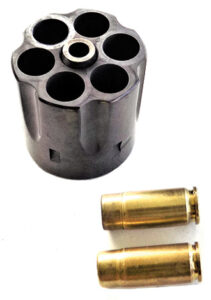
At 4.6 pounds, this Colt had a heavier trigger action than the other revolvers. Worse, there seemed to be a definite hitch of some type after the trigger was pressed and the hammer fell. It is difficult to describe, but the effect was disconcerting for accuracy. As for loading and unloading, the revolver was smooth enough, and the base pin was not difficult to remove. This revolver would be a candidate for a trigger job by a reputable gunsmith, which would have run the price of the revolver even higher.
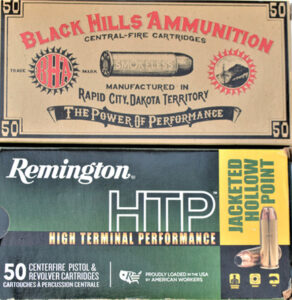
The revolver was fired with three loads. These included a Black Hills Ammunition 250-grain cowboy load, a Remington 230-grain JHP, and a Buffalo Bore 255-grain SWC. As a side test the rater owning this revolver fired several loads of 200 to 260 grains, including handloads, attempting to find one that struck to the point of aim. This revolver consistently struck 3 to 3.5 inches to the left of the point of aim with all raters.
The only means of correcting this is to have the barrel turned. This was once a common problem of single-action revolvers, but is much less an issue in revolvers we have tested during the past five to eight years.
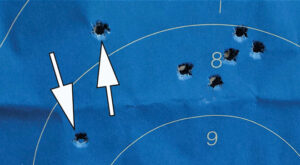
We also fired the revolver at human silhouette targets. The results were not bad because in rapid fire, the trigger did not impede accuracy as adversely. We punched rather than pressed the trigger in this type of shooting. In firing from a benchrest, accuracy suffered. The best group was with the Remington 230-grain JHP at 2.4 inches, most were at 3.0 inches or more. The 255-grain Buffalo Bore load was the hardest kicker at 939 fps. It wasn’t unpleasant; you simply knew you had fired a formidable handgun load. The Colt SAA as tested suffered from a poor trigger action.
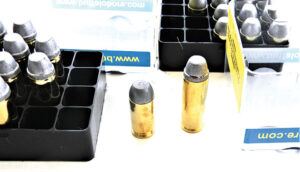
Our Team Said: We rated the revolver down a full grade on its poor trigger action and another half grade on accuracy, which likely was related to the trigger action. This revolver was a disappointment considering the price. Unless you are willing to get a trigger job done, we recommend finding a Colt SAA you may handle in person to check the action. In doing so, never place the revolver on half cock and then hold the trigger and lower the hammer. The bolt stop will rise and scour the cylinder, leaving a ring. Always bring the single-action revolver to full cock before lowering the hammer.
Range Data
| Colt Wiley Clapp Single Action Army 45 ACP | Black Hills 200-grain LSWC | Handload 260-grain SWC | Buffalo Bore 255-grain SWC |
| Average Velocity | 875 fps | 848 fps | 1025 fps |
| Muzzle Energy | 340 ft.-lbs. | 415 ft.-lbs. | 595 ft.-lbs. |
| Small group | 1.8 in. | 2.5 in. | 2.0 in. |
| Average Group | 2.4 in. | 2.9 in. | 2.5 in. |
| Colt Single Action Army P1840 45 Colt | Remington 230-grain JHP | Black Hills 250-grain LRN | Buffalo Bore 255-grain SWC |
| Average Velocity | 922 fps | 749 fps | 939 fps |
| Muzzle Energy | 434 ft.-lbs. | 311 ft.-lbs. | 499 ft.-lbs. |
| Small Group | 2.4 in. | 2.5 in. | 2.9 in. |
| Average Group | 3.0 in. | 3.2 in. | 3.5 in. |
| Traditions 1873 Frontier SAT73-002 45 Colt | Remington 230-grain JHP | Black Hills 250-grain LRN | Buffalo Bore 255-grain SWC |
| Average Velocity | 940 fps | 735 fps | 952 fps |
| Muzzle Energy | 451 ft.-lbs. | 300 ft.-lbs. | 513 ft.-lbs. |
| Small Group | 1.9 in. | 2.0 in. | 2.3 in. |
| Average Group | 2.3 in. | 2.3 in. | 2.9 in. |


